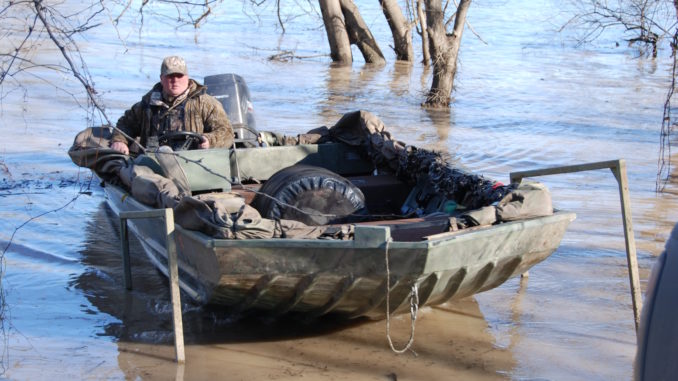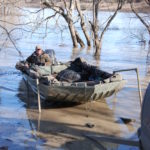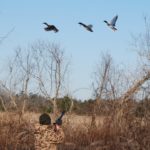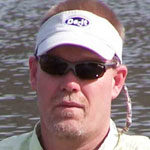
Waterfowl hunting on public land in the Upstate is not for the feint of heart, but the benefits are outstanding.
No question, there are easier things to do than hunt public land across the sprawling metropolis of South Carolina’s Upstate, which doesn’t boast of any rice fields or vast acres of marsh grass. Even water, the most primary of duck necessities, is often in short supply. Needless to say, Upstate duck hunters are a breed all their own. Under ideal conditions, duck hunting isn’t the easiest of outdoor pursuits. Add an addition degree of difficulty for the reduced amount of waterfowl habitat and another for the difficulty in locating and accesses areas with that habitat. Then, factor in the fact that there’s no shortage of other hunters who are just as crazy as you are. Fortunately, in the above equation, a lack of ducks is not a factor.
“You’ll have more wood ducks, but you will have some mallards, some local birds, and you’ll have some partial migration down from up north,” said Daryl Hodge, an upstate duck hunter from Lancaster who owns and operates Wrecking Crew Guide Service. “Last year, we saw actually several black ducks on Lake Wateree on opening day.”
Unlike Wildlife Management Areas, where hunters are regulated by drawing or at least by the number of days when hunting is allowed, waterfowl hunting on public waters has little or no restrictions. Lee Shropshire, another waterfowler who lives and hunts around Union County, said that’s part of the appeal.
“It isn’t always about the kill,” Shropshire said, “it’s about going out and having fun with your family and your friends. It’s getting to enjoy nature and appreciating what God gave you.”
Though Hodge and Shropshire do have a few private water holes where they hunt, both spend the majority of their time hunting waters and lands that are open to the public. They may not be the most accessible, but they are definitely public.
“We do most of our waterfowl hunting on the Wateree River, Lake Wateree and the Pee Dee River in Chesterfield County,” said Hodge. “On the lake, we hunt some nice sandbars and good bends in the upper end of the lake. On the Wateree River and the Great Pee Dee, if you’re in the banks, you’re okay to hunt. You’ll get away with a little bit at flood stage, but once you start getting in through the timber off the banks, then you’re getting on someone else’s land.”
One thing that sets Upstate hunters apart from those with the luxury of private lands and flooded crops is that public-land hunters put in more time before the hunt than they do during the hunt. That means plenty of time scouting, both on the road and in the boat.
“There are plenty of ducks to be killed in in the upstate of South Carolina,” Shropshire said. “It’s just doing your homework. It’s just like hunting turkeys or deer. You got to scout them, figure out where they’re going to be, what they’re going to be doing the day you hunt. All the factors are going to come into play: wind, weather and all that.”
The homework doesn’t end the day of the hunt, either. Some Upstate hunters go to great lengths to preserve the areas they want to hunt. Some even go in the night before.
“On the public waters, you definitely have to go in several hours before daylight and a lot of guys are actually camping out on some of the spots, just to hold them for the morning shoot,” Hodge said. “Especially in November and early December, when you have the two splits. The Thanksgiving season, then the following season, you’ll have several campers on the water the night before. It’s actually a good fellowship-type deal rather than just holding the hole. I think about 75 percent of it is just fellowship and a sort of celebration of finally getting to do our thing.”
“Our thing” for Shropshire means that less is more, especially in a situation where you have several groups of hunters vying for the attention of the same ducks. While most hunters would shun the whole idea, he uses the situation to his advantage.
“A lot of people want to get there early and go to the same spots,” he said. “Anytime I’ve been in places where there are a lot of people, it’s not where I want to be hunting. You’ve got too many people calling; you’ve got too many decoys; you’re not in Arkansas or Mississippi. Duck flies over, see 200 or 300 decoys sitting there; he’s going to say, ‘Well, this ain’t right. Let me go on down here where there’s this one guy’s only got a dozen decoys out.’ That’s going to look better to him.”
Good public water can be broken down into three basic groups: the headwaters of a reservoir where a tributary deltas into the lake; river runs, which typically focus on bends and wide spots in the river; and old oxbows or swamps contained within the river corridor. Each hunts differently, and Hodge and Shropshire each have different tactics for setting up on them.
“Ducks will fly up and down the river during the early season,” Hodge said. “But when the later season comes in and the temperatures get below freezing, all the water in the smaller bodies of impoundments — beaver swamps and even portions of different lakes — start to freeze, and that pushes the birds to open water. That’s when I like to hunt the sandbars.”
Hodge’s Wrecking Crew specializes in goose hunting during the early and late goose seasons. When hunting sandbars, they take that experience with them to hunt ducks.
“We set up a sandbar like we would a goose hunt,” he said. “On the river sandbars, I’ll set a few floater decoys out from the bar. I’ll set out different spreads of mallards and black ducks with a few wood duck decoys. But the key to making it look realistic to the ducks is to have some on land. I’ll actually use full body decoys to space along the sandbars, like they’re either feeding along the edges or resting. And we’ll hunt right in the spread, depending on the terrain; we’ll take our goose layout blinds and hunt out of them right on the sandbar.”
Shropshire likes to stay on land.
“When I’m hunting a river or the headwaters of a reservoir, I’ll dig in on the bank,” he said. “I have gone out there before and anchored down in the boat and put a spread out around me, but you’re got to have a good boat blind, and you have to stay covered so you’re hid good. An even better place to do that is in river channel where you’ve got high hunting activity and other hunters are pushing ducks to you.”
DESTINATION INFORMATION
WHERE TO HUNT — As a general rule, all navigable waters in South Carolina are public unless otherwise posted. Boundary markers are not so easily identified, but river boundaries tend to lie within the defined river banks. Productive Upstate rivers include the Broad and Great Pee Dee, and reservoirs include Wateree, Monticello and the upper end of Murray.
BEST TACTICS — If possible, make the best use of the terrain when hunting public land. That may mean brushing up an area along the side of a river or lake or using portable blinds to hide on an open-water sandbar. The more realistic your spread, in terms of layout and number of decoys, the better your chances of your setup being more appealing to passing ducks.
SEASON DATES — Duck season (including mergansers and coots) is open Nov. 17-24 and Dec. 8-Jan. 27. Canada geese and white-fronted geese may be hunted Nov. 17-24, Dec. 2-Feb. 1 and Feb. 4-8. Blue and snow geese may be hunted Nov. 17-24 and Dec. 8-Jan. 27. A hunting license, state waterfowl permit, and a federal duck stamp, plus the free Migratory Bird (HIP) Permit are required to hunt ducks. All waterfowl are considered migratory birds and as such, are a federally-protected species.
GUIDES/HUNTING INFO — Daryl Hodge, Wrecking Crew Guide Service, 803-320-1464, www.wreckingcrewguideservice.com; Lee Shropshire, Dirty South Ducks, 864-426-3007. See also Guides & Charters in Classifieds.
MAPS — Delorme South Carolina Atlas & Gazetteer, 1 (800) 561-5105 www.delorme.com; S.C. Department of Natural Resources, 803-734-3886, www.dnr.sc.gov.




Be the first to comment